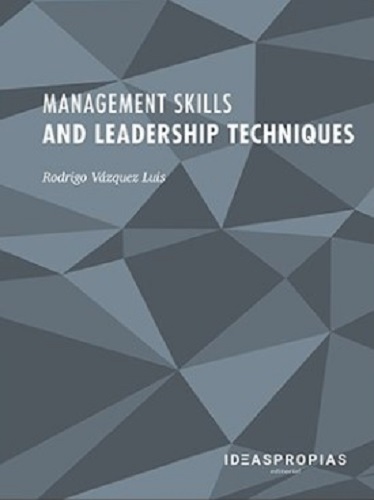This book brings together and expands upon the main activities that one needs to dominate if carrying out management functions. It includes an introduction to a set of skills that are common in management positions. Most of the skills in question are related to leadership. Leadership has been shown to be important in those cases where the organisation has to constantly adapt to the environment and is essential for making decisions and resolving conflicts within a group or for conducting a meeting. Leadership is, at present, one of the key requirements of a management role. This didactic material combines both theory and practice and helps the reader obtain a realistic view of the competencies required for a management position in any business organisation.With the help of this manual, published by Ideaspropias Editorial, you will acquire the necessary knowledge to become a senior manager in your company.
- Author
- Bibliography card
- 1 Time management
- 1.1. Introduction
- 1.2. Time as a resource
- 1.3. Analysis and diagnosis of the use of time
- 1.4. Time management tools
- 1.5. Problems with time and their causes
- 1.6. Summary of contents
- 2 Change management
- 2.1. Introduction
- 2.2. Change: adapting the organisation to the environment
- 2.3. Change and personnel: resistance to change
- 2.4. The need to anticipate change
- 2.5. Managing change
- 2.6. Summary of contents
- 3 Decision making and problem solving
- 3.1. Introduction
- 3.2. The problem-analysis process
- 3.3. The decision: primary variables
- 3.4. The decision-making process
- 3.5. Summary of contents
- 4 Conflict
- 4.1. Introduction
- 4.2. Conflict: types and causes
- 4.3. Conflict resolution
- 4.4. Handling conflict assertively
- 4.5. Summary of contents
- 5 Negotiation
- 5.1. Introduction
- 5.2. What is negotiation? From conflict to negotiation
- 5.3. The negotiating parties
- 5.4. Variables that influence negotiation
- 5.5. Tools for setting up a good negotiation
- 5.6. Summary of contents
- 6 Communication
- 6.1. Introduction
- 6.2. Communication styles
- 6.3. Elements of the communication process
- 6.4. Communication within the organisation
- 6.5. Competencies required of a good communicator
- 6.6. Summary of contents
- 7 Effective presentations
- 7.1. Introduction
- 7.2. Presentation concept and objectives
- 7.3. Key factors of a presentation
- 7.4. Preparing a presentation
- 7.5. Support media
- 7.6. How to win over the audience during the presentation
- 7.7. Summary of contents
- 8 Managing meetings
- 8.1. Introduction
- 8.2. Reasons for a meeting
- 8.3. The manager and the participants
- 8.4. The meeting development process
- 8.5. Summary of contents
- 9 Teamworking
- 9.1. Introduction
- 9.2. Benefits and drawbacks of teamwork
- 9.3. Work team development phases
- 9.4. Teamwork development tools
- 9.5. Summary of contents
- 10 Leadership
- 10.1. Introduction
- 10.2. Leadership approaches
- 10.2.1. Substantive approaches
- 10.2.2. Behavioural approaches
- 10.2.3. Situational approaches
- 10.2.4. Personalistic approaches
- 10.2.5. Prospective approaches
- 10.3. Leadership and management: two complementary actions
- 10.4. Profile of a good leader
- 10.5. Leadership styles
- 10.6. Motivation: a leaders basic tool
- 10.7. Tips on how to be a good leader
- 10.8. Summary of contents
- 11 Creativity
- 11.1. Introduction
- 11.2. What is creativity?
- 11.3. Techniques for boosting creativity
- 11.4. Summary of contents
- 12 Motivation
- 12.1. Introduction
- 12.2. Concept and cycle of motivation
- 12.3. Motivation and behaviour
- 12.4. Theories about motivation
- 12.4.1. Content motivation theories
- 12.4.2. Process motivation theories
- 12.5. Summary of contents
- SUMMARY
- Bibliography

